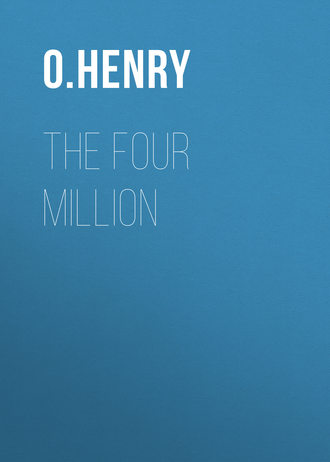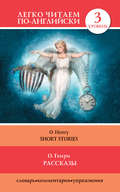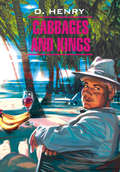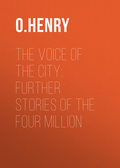
О. Генри
The Four Million
THE COMING-OUT OF MAGGIE
Every Saturday night the Clover Leaf Social Club gave a hop in the hall of the Give and Take Athletic Association on the East Side. In order to attend one of these dances you must be a member of the Give and Take – or, if you belong to the division that starts off with the right foot in waltzing, you must work in Rhinegold's paper-box factory. Still, any Clover Leaf was privileged to escort or be escorted by an outsider to a single dance. But mostly each Give and Take brought the paper-box girl that he affected; and few strangers could boast of having shaken a foot at the regular hops.
Maggie Toole, on account of her dull eyes, broad mouth and left-handed style of footwork in the two-step, went to the dances with Anna McCarty and her "fellow." Anna and Maggie worked side by side in the factory, and were the greatest chums ever. So Anna always made Jimmy Burns take her by Maggie's house every Saturday night so that her friend could go to the dance with them.
The Give and Take Athletic Association lived up to its name. The hall of the association in Orchard street was fitted out with muscle-making inventions. With the fibres thus builded up the members were wont to engage the police and rival social and athletic organisations in joyous combat. Between these more serious occupations the Saturday night hop with the paper-box factory girls came as a refining influence and as an efficient screen. For sometimes the tip went 'round, and if you were among the elect that tiptoed up the dark back stairway you might see as neat and satisfying a little welter-weight affair to a finish as ever happened inside the ropes.
On Saturdays Rhinegold's paper-box factory closed at 3 P. M. On one such afternoon Anna and Maggie walked homeward together. At Maggie's door Anna said, as usual: "Be ready at seven, sharp, Mag; and Jimmy and me'll come by for you."
But what was this? Instead of the customary humble and grateful thanks from the non-escorted one there was to be perceived a high-poised head, a prideful dimpling at the corners of a broad mouth, and almost a sparkle in a dull brown eye.
"Thanks, Anna," said Maggie; "but you and Jimmy needn't bother to-night. I've a gentleman friend that's coming 'round to escort me to the hop."
The comely Anna pounced upon her friend, shook her, chided and beseeched her. Maggie Toole catch a fellow! Plain, dear, loyal, unattractive Maggie, so sweet as a chum, so unsought for a two-step or a moonlit bench in the little park. How was it? When did it happen? Who was it?
"You'll see to-night," said Maggie, flushed with the wine of the first grapes she had gathered in Cupid's vineyard. "He's swell all right. He's two inches taller than Jimmy, and an up-to-date dresser. I'll introduce him, Anna, just as soon as we get to the hall."
Anna and Jimmy were among the first Clover Leafs to arrive that evening. Anna's eyes were brightly fixed upon the door of the hall to catch the first glimpse of her friend's "catch."
At 8:30 Miss Toole swept into the hall with her escort. Quickly her triumphant eye discovered her chum under the wing of her faithful Jimmy.
"Oh, gee!" cried Anna, "Mag ain't made a hit – oh, no! Swell fellow? well, I guess! Style? Look at 'um."
"Go as far as you like," said Jimmy, with sandpaper in his voice. "Cop him out if you want him. These new guys always win out with the push. Don't mind me. He don't squeeze all the limes, I guess. Huh!"
"Shut up, Jimmy. You know what I mean. I'm glad for Mag. First fellow she ever had. Oh, here they come."
Across the floor Maggie sailed like a coquettish yacht convoyed by a stately cruiser. And truly, her companion justified the encomiums of the faithful chum. He stood two inches taller than the average Give and Take athlete; his dark hair curled; his eyes and his teeth flashed whenever he bestowed his frequent smiles. The young men of the Clover Leaf Club pinned not their faith to the graces of person as much as they did to its prowess, its achievements in hand-to-hand conflicts, and its preservation from the legal duress that constantly menaced it. The member of the association who would bind a paper-box maiden to his conquering chariot scorned to employ Beau Brummel airs. They were not considered honourable methods of warfare. The swelling biceps, the coat straining at its buttons over the chest, the air of conscious conviction of the supereminence of the male in the cosmogony of creation, even a calm display of bow legs as subduing and enchanting agents in the gentle tourneys of Cupid – these were the approved arms and ammunition of the Clover Leaf gallants. They viewed, then, genuflexions and alluring poses of this visitor with their chins at a new angle.
"A friend of mine, Mr. Terry O'Sullivan," was Maggie's formula of introduction. She led him around the room, presenting him to each new-arriving Clover Leaf. Almost was she pretty now, with the unique luminosity in her eyes that comes to a girl with her first suitor and a kitten with its first mouse.
"Maggie Toole's got a fellow at last," was the word that went round among the paper-box girls. "Pipe Mag's floor-walker" – thus the Give and Takes expressed their indifferent contempt.
Usually at the weekly hops Maggie kept a spot on the wall warm with her back. She felt and showed so much gratitude whenever a self-sacrificing partner invited her to dance that his pleasure was cheapened and diminished. She had even grown used to noticing Anna joggle the reluctant Jimmy with her elbow as a signal for him to invite her chum to walk over his feet through a two-step.
But to-night the pumpkin had turned to a coach and six. Terry O'Sullivan was a victorious Prince Charming, and Maggie Toole winged her first butterfly flight. And though our tropes of fairyland be mixed with those of entomology they shall not spill one drop of ambrosia from the rose-crowned melody of Maggie's one perfect night.
The girls besieged her for introductions to her "fellow." The Clover Leaf young men, after two years of blindness, suddenly perceived charms in Miss Toole. They flexed their compelling muscles before her and bespoke her for the dance.
Thus she scored; but to Terry O'Sullivan the honours of the evening fell thick and fast. He shook his curls; he smiled and went easily through the seven motions for acquiring grace in your own room before an open window ten minutes each day. He danced like a faun; he introduced manner and style and atmosphere; his words came trippingly upon his tongue, and – he waltzed twice in succession with the paper-box girl that Dempsey Donovan brought.
Dempsey was the leader of the association. He wore a dress suit, and could chin the bar twice with one hand. He was one of "Big Mike" O'Sullivan's lieutenants, and was never troubled by trouble. No cop dared to arrest him. Whenever he broke a pushcart man's head or shot a member of the Heinrick B. Sweeney Outing and Literary Association in the kneecap, an officer would drop around and say:
"The Cap'n 'd like to see ye a few minutes round to the office whin ye have time, Dempsey, me boy."
But there would be sundry gentlemen there with large gold fob chains and black cigars; and somebody would tell a funny story, and then Dempsey would go back and work half an hour with the six-pound dumbbells. So, doing a tight-rope act on a wire stretched across Niagara was a safe terpsichorean performance compared with waltzing twice with Dempsey Donovan's paper-box girl. At 10 o'clock the jolly round face of "Big Mike" O'Sullivan shone at the door for five minutes upon the scene. He always looked in for five minutes, smiled at the girls and handed out real perfectos to the delighted boys.
Dempsey Donovan was at his elbow instantly, talking rapidly. "Big Mike" looked carefully at the dancers, smiled, shook his head and departed.
The music stopped. The dancers scattered to the chairs along the walls. Terry O'Sullivan, with his entrancing bow, relinquished a pretty girl in blue to her partner and started back to find Maggie. Dempsey intercepted him in the middle of the floor.
Some fine instinct that Rome must have bequeathed to us caused nearly every one to turn and look at them – there was a subtle feeling that two gladiators had met in the arena. Two or three Give and Takes with tight coat sleeves drew nearer.
"One moment, Mr. O'Sullivan," said Dempsey. "I hope you're enjoying yourself. Where did you say you live?"
The two gladiators were well matched. Dempsey had, perhaps, ten pounds of weight to give away. The O'Sullivan had breadth with quickness. Dempsey had a glacial eye, a dominating slit of a mouth, an indestructible jaw, a complexion like a belle's and the coolness of a champion. The visitor showed more fire in his contempt and less control over his conspicuous sneer. They were enemies by the law written when the rocks were molten. They were each too splendid, too mighty, too incomparable to divide pre-eminence. One only must survive.
"I live on Grand," said O'Sullivan, insolently; "and no trouble to find me at home. Where do you live?"
Dempsey ignored the question.
"You say your name's O'Sullivan," he went on. "Well, 'Big Mike' says he never saw you before."
"Lots of things he never saw," said the favourite of the hop.
"As a rule," went on Dempsey, huskily sweet, "O'Sullivans in this district know one another. You escorted one of our lady members here, and we want a chance to make good. If you've got a family tree let's see a few historical O'Sullivan buds come out on it. Or do you want us to dig it out of you by the roots?"
"Suppose you mind your own business," suggested O'Sullivan, blandly.
Dempsey's eye brightened. He held up an inspired forefinger as though a brilliant idea had struck him.
"I've got it now," he said cordially. "It was just a little mistake. You ain't no O'Sullivan. You are a ring-tailed monkey. Excuse us for not recognising you at first."
O'Sullivan's eye flashed. He made a quick movement, but Andy Geoghan was ready and caught his arm.
Dempsey nodded at Andy and William McMahan, the secretary of the club, and walked rapidly toward a door at the rear of the hall. Two other members of the Give and Take Association swiftly joined the little group. Terry O'Sullivan was now in the hands of the Board of Rules and Social Referees. They spoke to him briefly and softly, and conducted him out through the same door at the rear.
This movement on the part of the Clover Leaf members requires a word of elucidation. Back of the association hall was a smaller room rented by the club. In this room personal difficulties that arose on the ballroom floor were settled, man to man, with the weapons of nature, under the supervision of the board. No lady could say that she had witnessed a fight at a Clover Leaf hop in several years. Its gentlemen members guaranteed that.
So easily and smoothly had Dempsey and the board done their preliminary work that many in the hall had not noticed the checking of the fascinating O'Sullivan's social triumph. Among these was Maggie. She looked about for her escort.
"Smoke up!" said Rose Cassidy. "Wasn't you on? Demps Donovan picked a scrap with your Lizzie-boy, and they've waltzed out to the slaughter room with him. How's my hair look done up this way, Mag?"
Maggie laid a hand on the bosom of her cheesecloth waist.
"Gone to fight with Dempsey!" she said, breathlessly. "They've got to be stopped. Dempsey Donovan can't fight him. Why, he'll – he'll kill him!"
"Ah, what do you care?" said Rosa. "Don't some of 'em fight every hop?"
But Maggie was off, darting her zig-zag way through the maze of dancers. She burst through the rear door into the dark hall and then threw her solid shoulder against the door of the room of single combat. It gave way, and in the instant that she entered her eye caught the scene – the Board standing about with open watches; Dempsey Donovan in his shirt sleeves dancing, light-footed, with the wary grace of the modern pugilist, within easy reach of his adversary; Terry O'Sullivan standing with arms folded and a murderous look in his dark eyes. And without slacking the speed of her entrance she leaped forward with a scream – leaped in time to catch and hang upon the arm of O'Sullivan that was suddenly uplifted, and to whisk from it the long, bright stiletto that he had drawn from his bosom.
The knife fell and rang upon the floor. Cold steel drawn in the rooms of the Give and Take Association! Such a thing had never happened before. Every one stood motionless for a minute. Andy Geoghan kicked the stiletto with the toe of his shoe curiously, like an antiquarian who has come upon some ancient weapon unknown to his learning.
And then O'Sullivan hissed something unintelligible between his teeth. Dempsey and the board exchanged looks. And then Dempsey looked at O'Sullivan without anger, as one looks at a stray dog, and nodded his head in the direction of the door.
"The back stairs, Giuseppi," he said, briefly. "Somebody'll pitch your hat down after you."
Maggie walked up to Dempsey Donovan. There was a brilliant spot of red in her cheeks, down which slow tears were running. But she looked him bravely in the eye.
"I knew it, Dempsey," she said, as her eyes grew dull even in their tears. "I knew he was a Guinea. His name's Tony Spinelli. I hurried in when they told me you and him was scrappin'. Them Guineas always carries knives. But you don't understand, Dempsey. I never had a fellow in my life. I got tired of comin' with Anna and Jimmy every night, so I fixed it with him to call himself O'Sullivan, and brought him along. I knew there'd be nothin' doin' for him if he came as a Dago. I guess I'll resign from the club now."
Dempsey turned to Andy Geoghan.
"Chuck that cheese slicer out of the window," he said, "and tell 'em inside that Mr. O'Sullivan has had a telephone message to go down to Tammany Hall."
And then he turned back to Maggie.
"Say, Mag," he said, "I'll see you home. And how about next Saturday night? Will you come to the hop with me if I call around for you?"
It was remarkable how quickly Maggie's eyes could change from dull to a shining brown.
"With you, Dempsey?" she stammered. "Say – will a duck swim?"
MAN ABOUT TOWN
There were two or three things that I wanted to know. I do not care about a mystery. So I began to inquire.
It took me two weeks to find out what women carry in dress suit cases. And then I began to ask why a mattress is made in two pieces. This serious query was at first received with suspicion because it sounded like a conundrum. I was at last assured that its double form of construction was designed to make lighter the burden of woman, who makes up beds. I was so foolish as to persist, begging to know why, then, they were not made in two equal pieces; whereupon I was shunned.
The third draught that I craved from the fount of knowledge was enlightenment concerning the character known as A Man About Town. He was more vague in my mind than a type should be. We must have a concrete idea of anything, even if it be an imaginary idea, before we can comprehend it. Now, I have a mental picture of John Doe that is as clear as a steel engraving. His eyes are weak blue; he wears a brown vest and a shiny black serge coat. He stands always in the sunshine chewing something; and he keeps half-shutting his pocket knife and opening it again with his thumb. And, if the Man Higher Up is ever found, take my assurance for it, he will be a large, pale man with blue wristlets showing under his cuffs, and he will be sitting to have his shoes polished within sound of a bowling alley, and there will be somewhere about him turquoises.
But the canvas of my imagination, when it came to limning the Man About Town, was blank. I fancied that he had a detachable sneer (like the smile of the Cheshire cat) and attached cuffs; and that was all. Whereupon I asked a newspaper reporter about him.
"Why," said he, "a 'Man About Town' something between a 'rounder' and a 'clubman.' He isn't exactly – well, he fits in between Mrs. Fish's receptions and private boxing bouts. He doesn't – well, he doesn't belong either to the Lotos Club or to the Jerry McGeogheghan Galvanised Iron Workers' Apprentices' Left Hook Chowder Association. I don't exactly know how to describe him to you. You'll see him everywhere there's anything doing. Yes, I suppose he's a type. Dress clothes every evening; knows the ropes; calls every policeman and waiter in town by their first names. No; he never travels with the hydrogen derivatives. You generally see him alone or with another man."
My friend the reporter left me, and I wandered further afield. By this time the 3126 electric lights on the Rialto were alight. People passed, but they held me not. Paphian eyes rayed upon me, and left me unscathed. Diners, heimgangers, shop-girls, confidence men, panhandlers, actors, highwaymen, millionaires and outlanders hurried, skipped, strolled, sneaked, swaggered and scurried by me; but I took no note of them. I knew them all; I had read their hearts; they had served. I wanted my Man About Town. He was a type, and to drop him would be an error – a typograph – but no! let us continue.
Let us continue with a moral digression. To see a family reading the Sunday paper gratifies. The sections have been separated. Papa is earnestly scanning the page that pictures the young lady exercising before an open window, and bending – but there, there! Mamma is interested in trying to guess the missing letters in the word N_w Yo_k. The oldest girls are eagerly perusing the financial reports, for a certain young man remarked last Sunday night that he had taken a flyer in Q., X. & Z. Willie, the eighteen-year-old son, who attends the New York public school, is absorbed in the weekly article describing how to make over an old skirt, for he hopes to take a prize in sewing on graduation day.
Grandma is holding to the comic supplement with a two-hours' grip; and little Tottie, the baby, is rocking along the best she can with the real estate transfers. This view is intended to be reassuring, for it is desirable that a few lines of this story be skipped. For it introduces strong drink.
I went into a café to – and while it was being mixed I asked the man who grabs up your hot Scotch spoon as soon as you lay it down what he understood by the term, epithet, description, designation, characterisation or appellation, viz.: a "Man About Town."
"Why," said he, carefully, "it means a fly guy that's wise to the all-night push – see? It's a hot sport that you can't bump to the rail anywhere between the Flatirons – see? I guess that's about what it means."
I thanked him and departed.
On the sidewalk a Salvation lassie shook her contribution receptacle gently against my waistcoat pocket.
"Would you mind telling me," I asked her, "if you ever meet with the character commonly denominated as 'A Man About Town' during your daily wanderings?"
"I think I know whom you mean," she answered, with a gentle smile. "We see them in the same places night after night. They are the devil's body guard, and if the soldiers of any army are as faithful as they are, their commanders are well served. We go among them, diverting a few pennies from their wickedness to the Lord's service."
She shook the box again and I dropped a dime into it.
In front of a glittering hotel a friend of mine, a critic, was climbing from a cab. He seemed at leisure; and I put my question to him. He answered me conscientiously, as I was sure he would.
"There is a type of 'Man About Town' in New York," he answered. "The term is quite familiar to me, but I don't think I was ever called upon to define the character before. It would be difficult to point you out an exact specimen. I would say, offhand, that it is a man who had a hopeless case of the peculiar New York disease of wanting to see and know. At 6 o'clock each day life begins with him. He follows rigidly the conventions of dress and manners; but in the business of poking his nose into places where he does not belong he could give pointers to a civet cat or a jackdaw. He is the man who has chased Bohemia about the town from rathskeller to roof garden and from Hester street to Harlem until you can't find a place in the city where they don't cut their spaghetti with a knife. Your 'Man About Town' has done that. He is always on the scent of something new. He is curiosity, impudence and omnipresence. Hansoms were made for him, and gold-banded cigars; and the curse of music at dinner. There are not so many of him; but his minority report is adopted everywhere.
"I'm glad you brought up the subject; I've felt the influence of this nocturnal blight upon our city, but I never thought to analyse it before. I can see now that your 'Man About Town' should have been classified long ago. In his wake spring up wine agents and cloak models; and the orchestra plays 'Let's All Go Up to Maud's' for him, by request, instead of Händel. He makes his rounds every evening; while you and I see the elephant once a week. When the cigar store is raided, he winks at the officer, familiar with his ground, and walks away immune, while you and I search among the Presidents for names, and among the stars for addresses to give the desk sergeant."
My friend, the critic, paused to acquire breath for fresh eloquence. I seized my advantage.
"You have classified him," I cried with joy. "You have painted his portrait in the gallery of city types. But I must meet one face to face. I must study the Man About Town at first hand. Where shall I find him? How shall I know him?"
Without seeming to hear me, the critic went on. And his cab-driver was waiting for his fare, too.
"He is the sublimated essence of Butt-in; the refined, intrinsic extract of Rubber; the concentrated, purified, irrefutable, unavoidable spirit of Curiosity and Inquisitiveness. A new sensation is the breath in his nostrils; when his experience is exhausted he explores new fields with the indefatigability of a – "
"Excuse me," I interrupted, "but can you produce one of this type? It is a new thing to me. I must study it. I will search the town over until I find one. Its habitat must be here on Broadway."
"I am about to dine here," said my friend. "Come inside, and if there is a Man About Town present I will point him out to you. I know most of the regular patrons here."
"I am not dining yet," I said to him. "You will excuse me. I am going to find my Man About Town this night if I have to rake New York from the Battery to Little Coney Island."
I left the hotel and walked down Broadway. The pursuit of my type gave a pleasant savour of life and interest to the air I breathed. I was glad to be in a city so great, so complex and diversified. Leisurely and with something of an air I strolled along with my heart expanding at the thought that I was a citizen of great Gotham, a sharer in its magnificence and pleasures, a partaker in its glory and prestige.
I turned to cross the street. I heard something buzz like a bee, and then I took a long, pleasant ride with Santos-Dumont.
When I opened my eyes I remembered a smell of gasoline, and I said aloud: "Hasn't it passed yet?"
A hospital nurse laid a hand that was not particularly soft upon my brow that was not at all fevered. A young doctor came along, grinned, and handed me a morning newspaper.
"Want to see how it happened?" he asked cheerily. I read the article. Its headlines began where I heard the buzzing leave off the night before. It closed with these lines:
" – Bellevue Hospital, where it was said that his injuries were not serious. He appeared to be a typical Man About Town."







